What you absolutely need to know to avoid making mistakes with microswitches
There are “limit switches” and “micro switches” as switches that are inexpensive and readily available.
But be careful if you are selecting them based on price alone.
- "The micro switch malfunctioned as its precision was not enough…”
- "The facility stopped due to micro switch failure, leading to complaints…”
- "There are only options for micro switches and limit switches…”
In recent years, machines have become smaller and more precise, and the number of designers and device users who have this problem is increasing.
In the background, it is not uncommon for people to be unaware of the characteristics of micro switches when using them.
In this article, we will explain the basic knowledge of micro switches and their advantages and disadvantages for each application.
We will also explain METROL's "precision positioning touch switches" from the perspective of a "third switch" that is not a micro switch nor limit switch.
●What you can learn from this article
・Basic knowledge of micro switches and limit switches
・Three risks that tend to be overlooked when selecting switches
・Differences between micro switches and Metrol’s precision positioning switches
・A collection of use cases of precision positioning switches
We publish the [collection of touch switch introduction cases] that we would like to show those who are involved in design, production technology, purchasing, and maintenance who deal with switches!

Table of Contents
What are the roles of micro switches and limit switches?
What is a switch in the first place?
As the name suggests, a switch is something that "switches".
There are three typical contact switches as below:
- Micro switch
- Limit switch
- Precision positioning touch switch
A switch opens and closes an electrical circuit (ON/OFF).
Therefore, switches are incorporated into electric products around us, robots, and production facilities, etc. to perform control.
First, we will explain the characteristics of micro switches and limit switches.
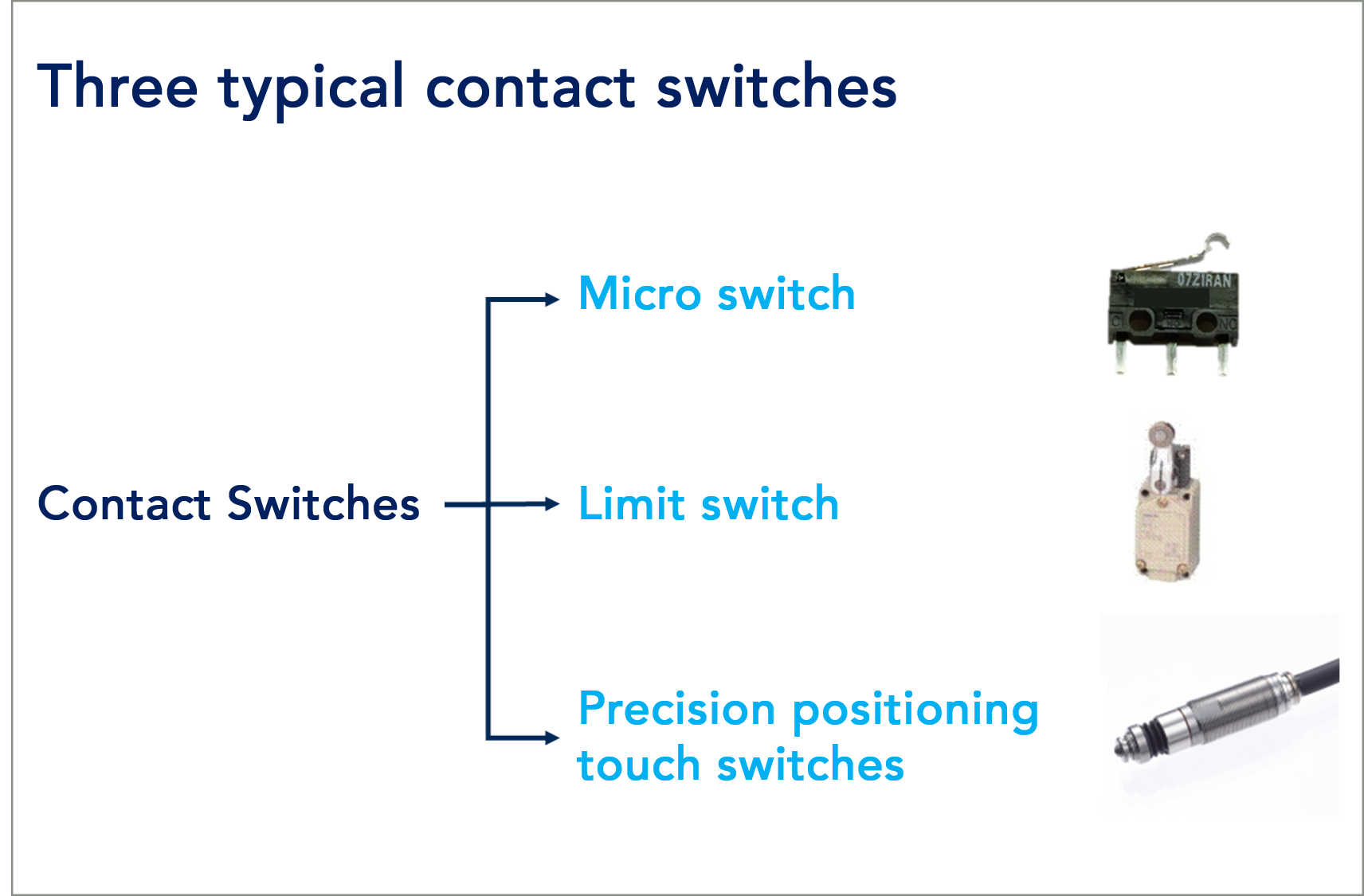
What is the difference between micro switches and limit switches?
What is a micro switch?
A micro switch is a small plastic-encased switch with a snap action mechanism and contacts. (See Fig. 1)
When a part called an actuator is moved up and down, the internal contact opens and closes, turning power on and off.
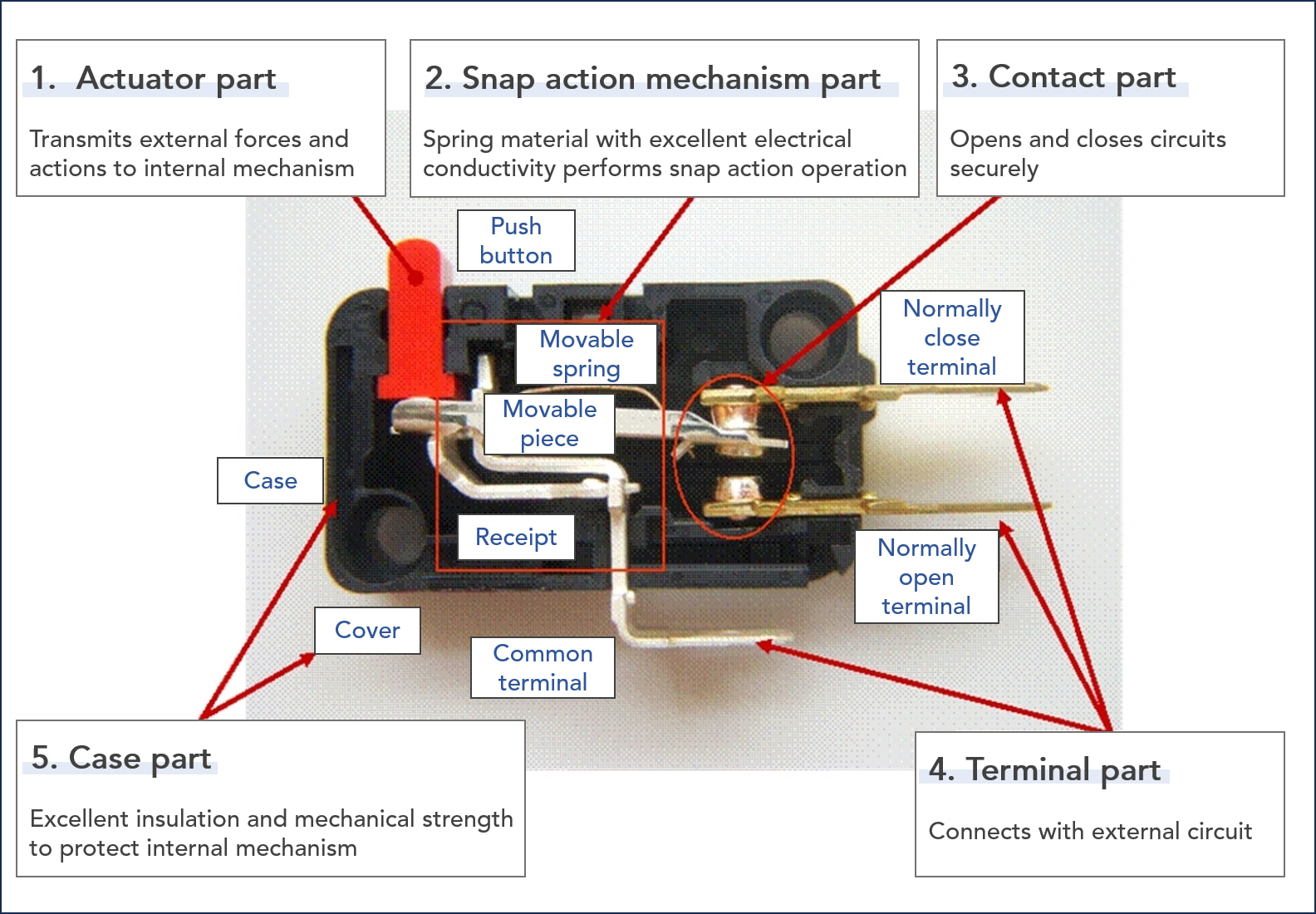
What is a limit switch?
A limit switch is a switch covered with a plastic or metal cover to make a micro switch waterproof and dustproof.
Its role is to detect the presence or absence like a micro switch, but it is used in a harsh environment with water, oil, dust, etc.
When operating, a part called a dog* is attached to the facility and used by operating the actuator part of the limit switch. (See Fig. 2)
What is a dog?
A part installed in a machine or facility to push in or back the actuator of a limit switch
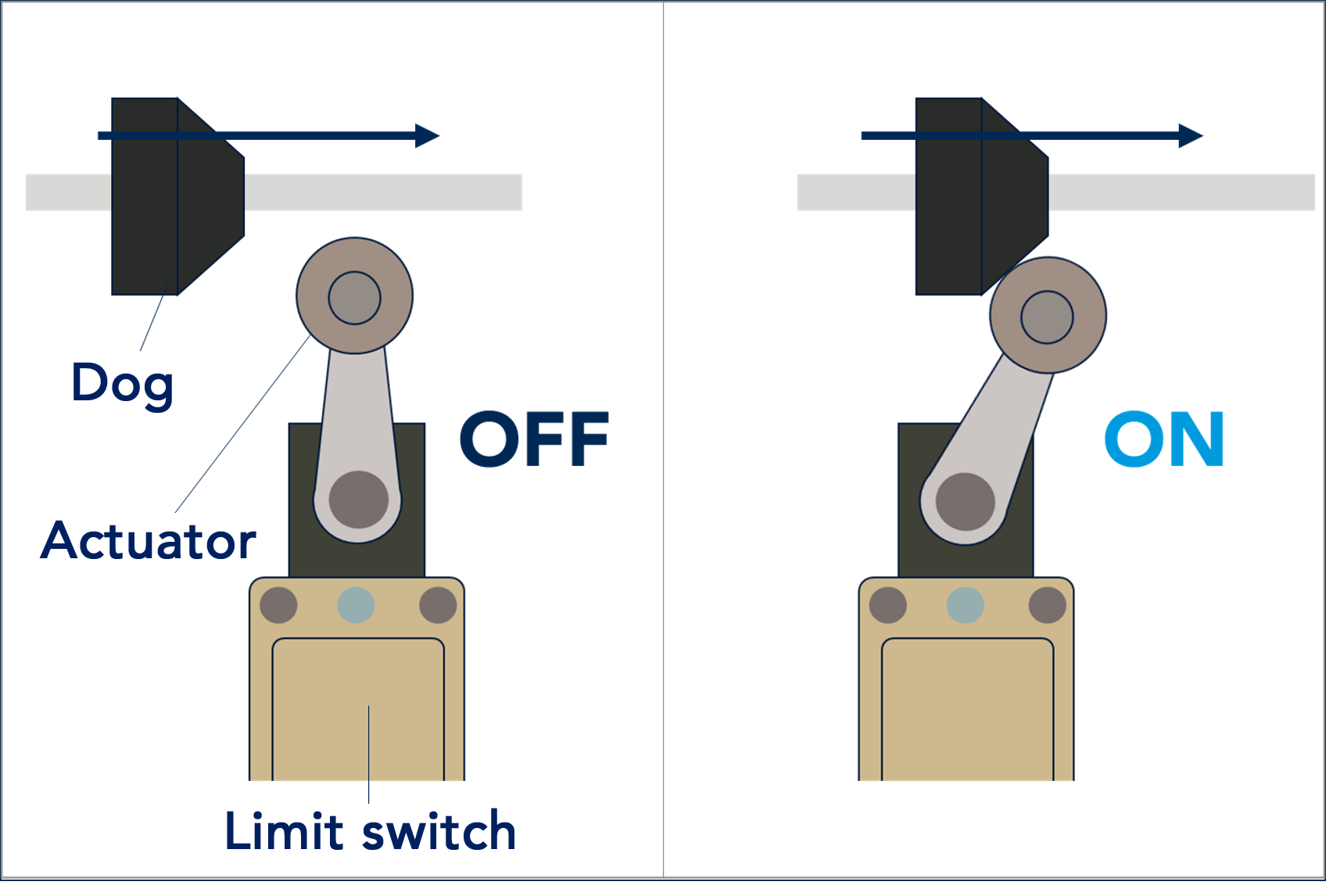
What is the role of a micro switch, “presence/absence detection”?
Both micro switches and limit switches play the role of "presence/absence detection or existence detection" because they notify the existence of the detected object when it comes into contact with the actuator.
What is “presence/absence detection”?
- To confirm whether there is a detected object or not
- Whether (the lid is) closed or open
- Whether it passed or not
and so on. (See Fig. 3)
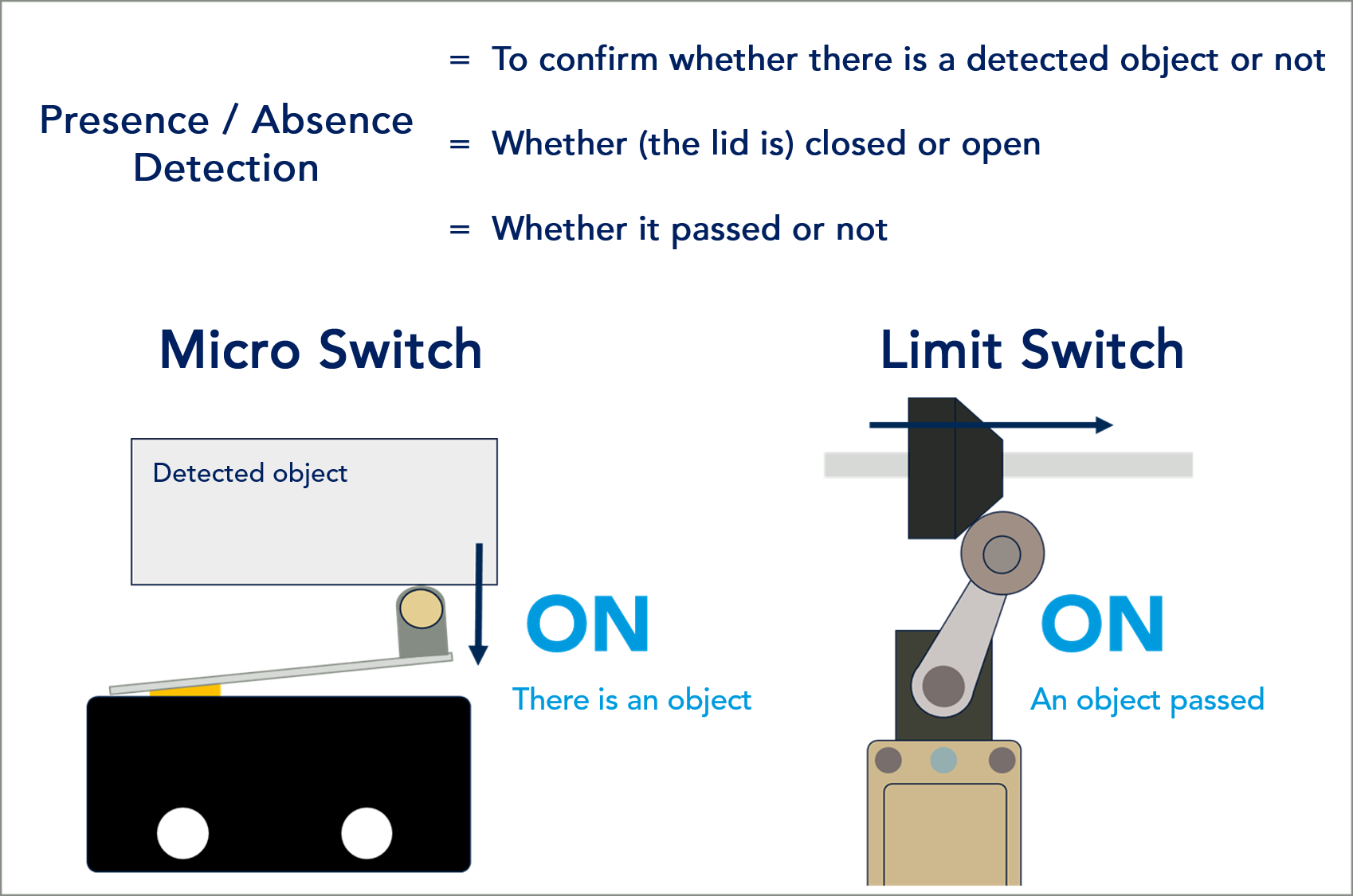
Applications of micro switches (limit switches)
Micro switches are used in a variety of places for presence/absence detection, to home appliances to industrial production facilities.
For example
Home appliances:
- Refrigerator door
- Vacuum cleaner
- Car
- Microwave door switch
- Mouse click part
- Electric tool trigger
Industrial products and facilities:
- Origin positioning of XY stage
- Opening and closing facility doors
- Confirming workpiece passage
- Confirming the position of jigs and cylinders
Microswitches are embedded in all of these presence/absence detection mechanisms.
General specifications of micro switches
Some common specifications include:
- Mechanical life* is about 500,000 to 1,000,000 times
- Electrical life* is 200,000 times
- Protection class IP40 or above (No waterproof or drip-proof specifications)
- No accuracy guarantee
- Unit price (around 100 to 500 yen)
From the above, it can be said that the micro switch is a low-cost switch useful in a clean environment where precision is not required.
*Difference between "Mechanical life" and "Electrical life"
Mechanical Life: Refers to the maximum number of times a switch can operate (ON/OFF). This can also be tested with no current flowing. It refers to the period of time before the switch physically breaks down or stops operating.
Electrical life: The endurance performance when the switch is turned on and off at the specified operating frequency under a load that keeps the voltage and current at the rated values. As the switch conducts current, the contacts wear out and eventually stop the current flow. It is usually shorter than the mechanical life.
In other words, it may be easier to understand if you think of the mechanical life as the maximum number of times you can “push” and the electrical life as the maximum number of times you can “flow”.
What are the 3 RISKS hidden in switch selection?
The price of a micro switch is attractive in terms of design, but the cost of the switch itself (initial cost) is just the tip of the total cost iceberg. Keep in mind that improper use and usage can lead to increased costs.
Risks that lead to cost increases in the long term can be broadly divided into three categories.
- Risk 1: Maintenance cost due to repair
- Risk 2: Cost increase in manufacturing
- Risk 3: Cost of lowering brand reputation
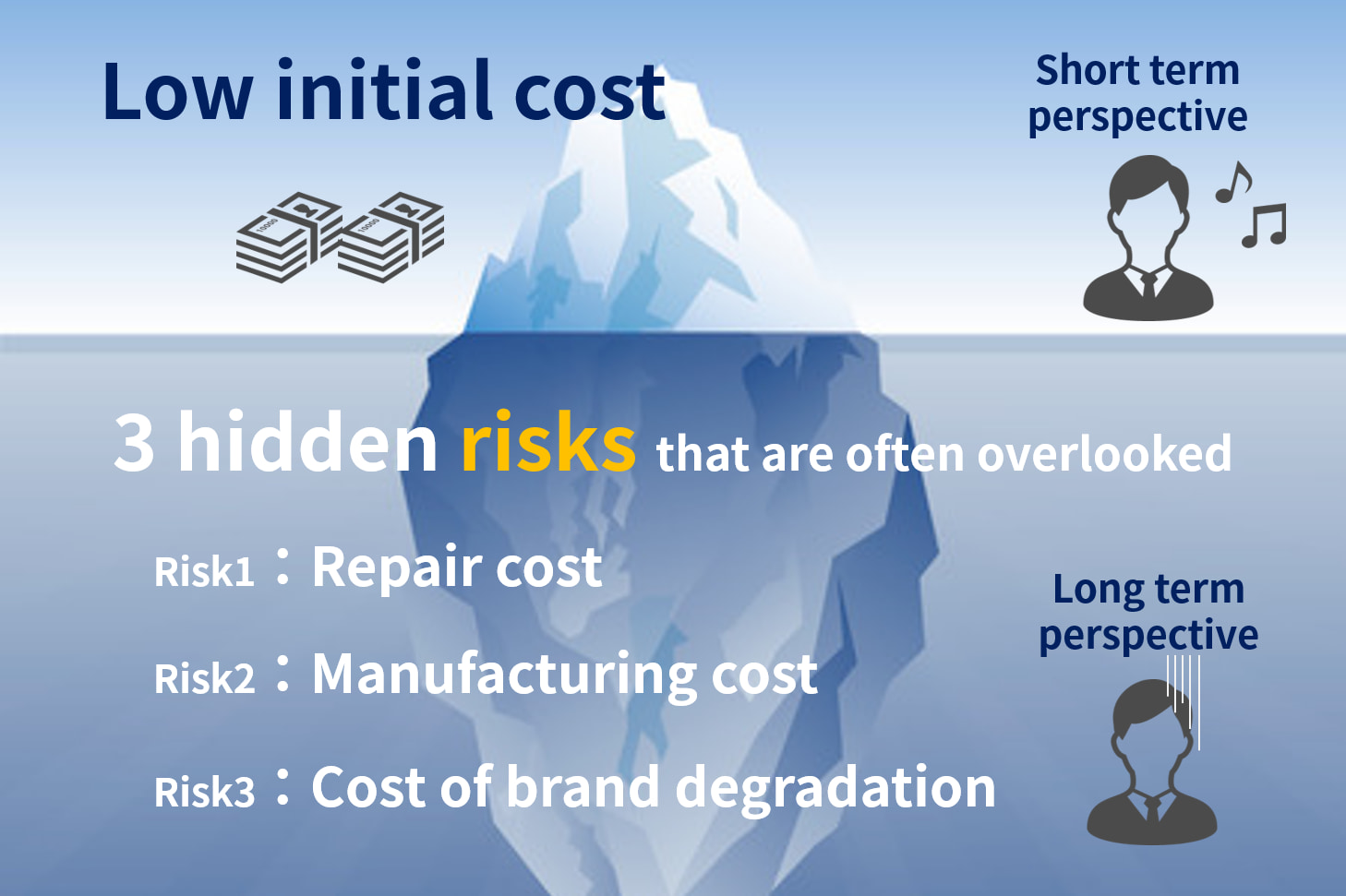
Risk1:Increased maintenance costs
Repair costs due to switch failure (labor, travel, service costs)
Facility outages incur costs for maintenance staff urgently dispatched to the site to respond. This is the source of potential cost increases.
Appropriate cost management is required based on the purchase of spare parts for sensors and the track record of paid repairs.
Risk2:Increased assembly costs
This is the cost associated with installing the intermediate mechanism required for switch operation.
Installing a dog or actuator to operate a micro switch may result in costs such as increased space and parts, increased facility size, and increased assembly time.
Examples: Intermediary actuators, design/manufacturing costs and assembly time of dogs, potential lost costs due to space requirements
Risk3:Cost of lowering brand reputation
Even if the performance of the machine as a whole is excellent, frequent failures or malfunctions in individual sub-functions (e.g. door opening/closing, loading/unloading) and short stoppages can cause customer dissatisfaction and damage to the brand image.
This leads to
・Decrease in facility utilization/availability *1
・Opportunity loss due to idle machines
and so on, also a loss for the user.
You should avoid the situation in which an expensive facility stops due to a switch failure, as it costs more to repair a damaged brand image.
In conclusion, it is necessary to pay attention to future opportunity loss (switching to other companies, etc.) due to the deterioration of the brand image.
*1: What is the availability?
It refers to “the percentage of time that the facility is operating normally when you want to operate it.”
When the facility stops due to failure or error (short stoppage), the availability decreases.
3 cases of failure in adopting micro switches
There are quite a few cases in which the lack of specifications is discovered later, triggered by troubles caused by defective or damaged micro switches.
Troubles caused by micro switches are triggered when the lack of specifications becomes apparent later. Below are three cases.
Case 1: Using micro switches for harsh environments
Many micro switches are IP40 (non-waterproof, non-dustproof), so moisture, water, oil, and chips can cause problems such as corrosion and deterioration.
Assume that the user's site is an environment that leads to problems, even if it is not assumed at the design stage.
Case 2: Adopting micro switches when “precision” is required
If a micro switch for presence/absence detection is used for positioning or returning to origin that requires precision, there is a risk of instability.
- [NG example 1] When returning to origin with a micro switch on the XY table of a 3D printer, the accuracy was not high enough, leading to the problem of defective products.
- [NG example 2] When using it as a workpiece seating switch in a machine tool, the workpiece "floated" and accurate seating could not be seen.
Case 3: Adopting micro switches in situations where the load is large
If the electrical life limit is exceeded, or if the switch is used in an application where a strong impact is applied to the switch, failure will occur early.
Avoid using the switch itself as a stopper when using it to limit the range of motion of the machine.
If the load is large, the plastic case may crack or warp, or the mounting position may shift.
Commentary: Why are micro switches (limit switches) inaccurate?
It is better to think that the concept of 'repeatability' does not exist in principle of micro switches for presence/absence detection.
The reason is because there is a mechanism called "snap action mechanism*."
The "snap action mechanism" is a mechanism that quickly contacts and releases the contact with a "snap" via a leaf spring when turning on and off, and a micro switch is defined as a switch with this mechanism. (See the video)
This snap action mechanism generates a hysteresis*, and the reproducibility of the switch operation timing is not stable, which means the repeatability is low. Therefore, the snap action itself is effective in extending the life of the contact, but it works in the direction of lowering the accuracy.
*The birth background of the "snap action mechanism"... In the past, AC 100V was the main power supply and a large voltage current flowed through the contacts, so a structure called "snap action" was born to prevent the contacts from welding or galvanic corrosion by quickly contacting and releasing the contacts. *What is hysteresis? The distance between the point where the actuator moves for the first time from the free position when the actuator is pushed in, and the point where it moves for the first time when returning.
4 points for switch selection
From the design stage, it is important to rigorously estimate the usage conditions of the switch.
Avoiding troubles before they occur leads to future maintenance and after-sales service cost reductions and customer satisfaction.
Below are four things to consider when selecting:
- How much accuracy is required?
Check whether the accuracy of the presence/absence detection is sufficient or whether strict reproducibility is required. - Are the durability and reliability appropriate?
"How often does it turn on and off? "
"Will the switch be subject to vibration or strong impact?"
"Doesn't the switch itself act as a stopper?"
Depending on how often the device is used and how many times the switch is operated, the switch to be selected may change. - Environments that lead to switch malfunctions, such as water, oil, and dust, are anticipated?
Take account of the location where the device will be installed and the environment in which the switch will be used. If there are specific environmental factors such as moisture, oil, dust, high temperature, low temperature, etc., it is necessary to select a switch that is waterproof and environment resistant.
- What is the range of impact in the unlikely event that the switch fails?
Take account of the expected life of the device, the frequency of maintenance, and the safety requirements of the device.
So, what other options exist besides micro switches?
We will explain METROL's "precision positioning touch switches" that are different from micro switches.
What are the 5 reasons to select “precision positioning touch switches”?
METROL's "precision positioning touch switches" were developed based on the design concept of a contact-type switch with high durability that are versatile and can be used in a variety of facilities, and perform high-precision detection even in harsh environments.
Their uses are similar to those of micro switches and limit switches, but the development concept is significantly different from that of "presence/absence detection."
We will explain the five reasons why positioning touch switches are selected.

Reason 1: Precise positioning is possible instead of presence/absence detection
Precision positioning touch switches feature a high repeatability of ±0.5 μm to ±10 μm.
Since there is no hysteresis, positioning is possible with higher repeatability than presence/absence detection.
Unlike micro switches, one of the reasons for its high precision is that it does not have a snap action mechanism.
Combining it with the machine coordinates of facilities and devices enables highly accurate positioning and measurement on the order of microns.
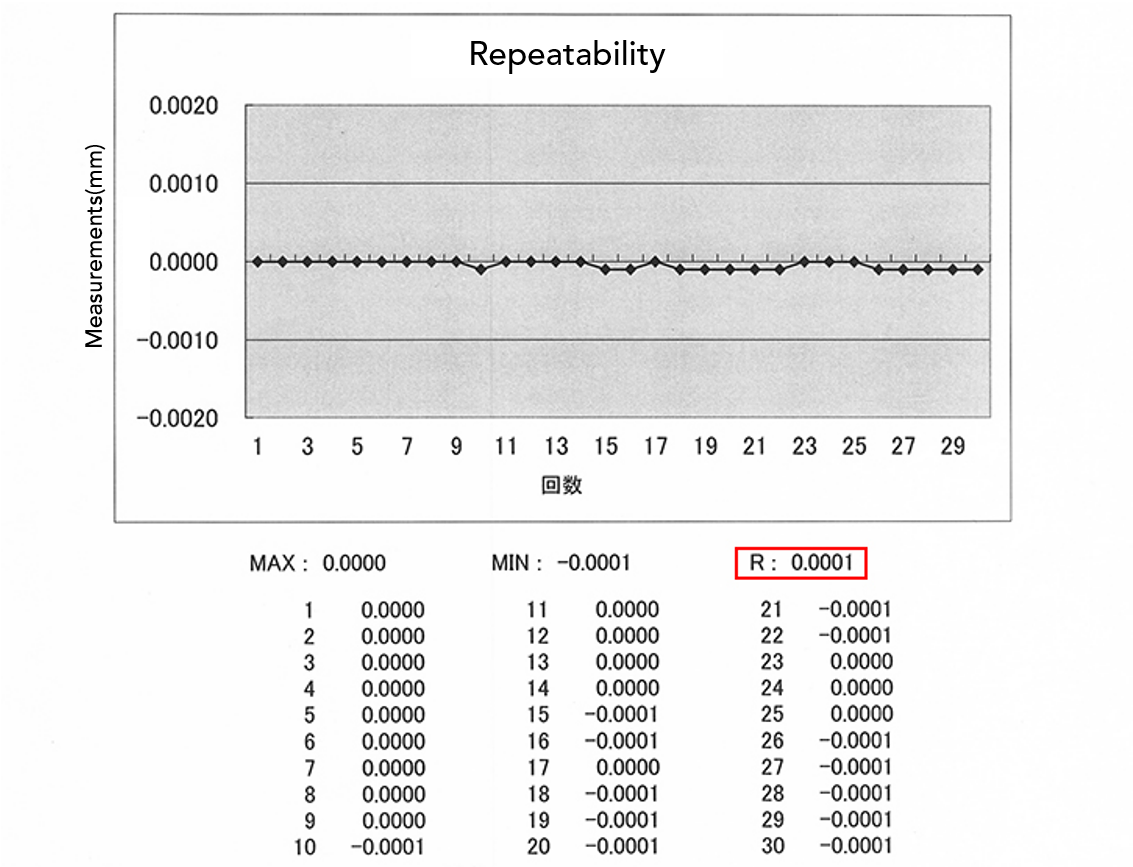
Reason 2: Long life
Long-term endurance tests are conducted using endurance test equipment dedicated to touch switches to confirm accuracy. (See the video)
Depending on the series, we guarantee an accuracy life of 1,000,000 times for short ones and 10,000,000 times for long ones.
Reason 3: High durability
It is so waterproof and dustproof that it is used inside machine tools that use cutting oil.
Unlike plastic switches, most of them are covered with a metal case and have IP67 (resistance to water, oil, dust, etc.) specifications.
For switches with IP67 or higher, a waterproof test is performed before shipment.
Reason 4: No dog required for operation
It does not require a dog like a limit switch, making the machine smaller and reducing assembly man-hours.
Reason 5: 100% domestic production, easy customization
All series are planned, designed, and manufactured at our factory in Tokyo, and many switches can be customized and made to order according to standards such as shape, material, contact force, and cable length.
Precision positioning touch switches [Introduction cases]
Many precision positioning touch switches have been introduced in applications such as:
- High-precision return-to-origin switches for XY tables and stages (milling machines, 3D printers, chip mounters, etc.)
- Positioning where accuracy is required
- Origin positioning for dispenser nozzles
- Origin positioning for small diameter tools
- Adhesion confirmation of jigs and molds
- Thermal displacement compensation of facilities
- Parallelization mechanism for medical surgical robots
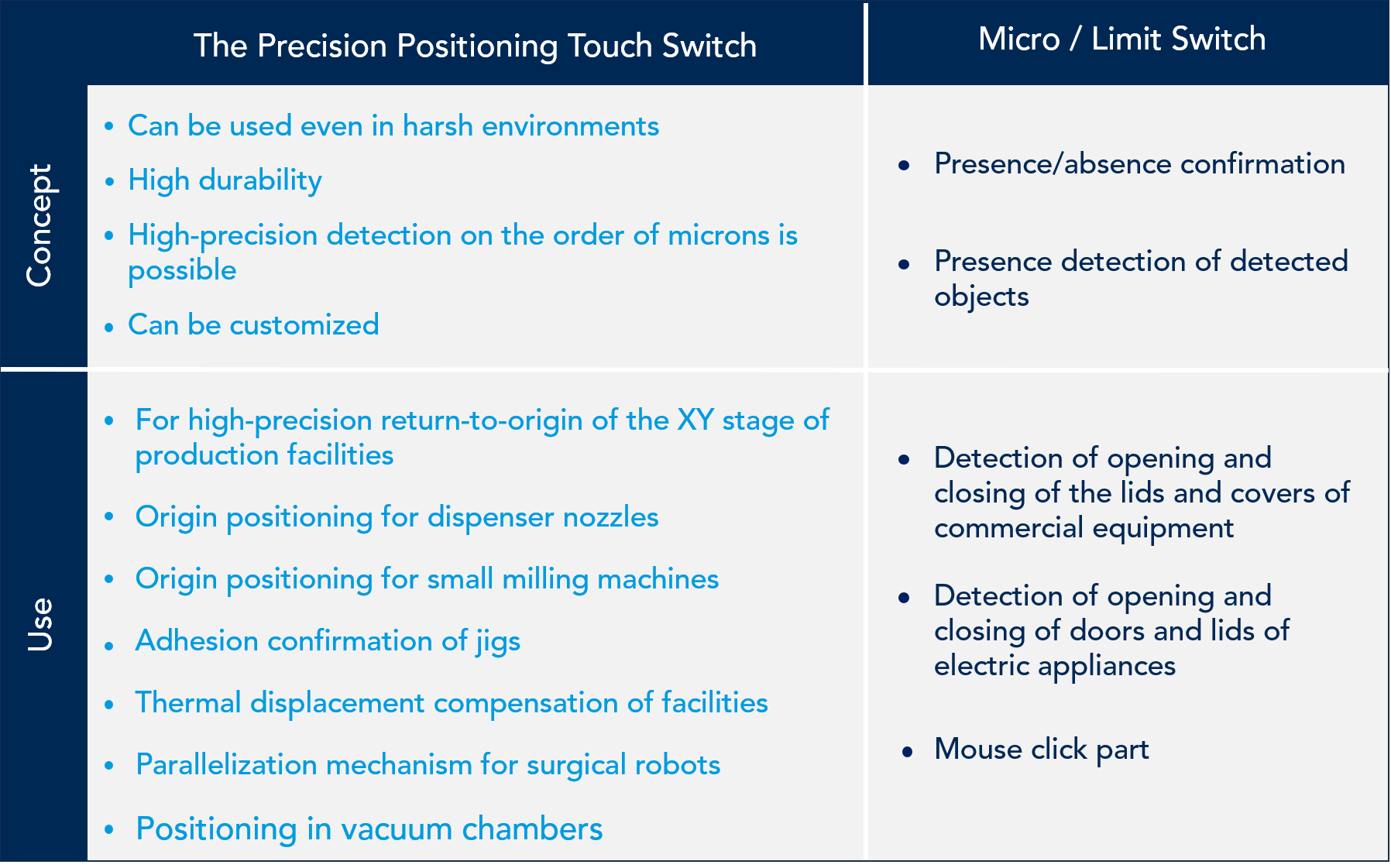
Background of the creation of the precision positioning touch switch
The development of the "precision positioning switch" was triggered by the increasing need for jigs for automatic equipment and high-precision sensors that determine the origin of stages.
When automatic equipment and NC machine tools began to spread rapidly, there were few sensors suitable for micron precision detection, and inexpensive micro switches and proximity sensors were used instead.
Because micro switches are primarily intended for “presence/absence detection”, micron-precision applications require careful judgment.
As a result, erroneous detection and durability problems occurred, and the "precision positioning switch" was born as a product to meet these needs.
Precision positioning touch switch: Introduction of 6 series
We have a wide lineup of precision positioning touch switches, but we would like to introduce the best-selling representative six series.
① Ultra-compact, high-precision [PT series]
World's smallest size, high-precision series
The series features small size but high repeatability.
Even though it is ultra-compact with a diameter of φ5mm, it has a repeatability of 1μm and is often used in narrow spaces.
[PT series] Evaluation by users who adopted 👤“With a wide variety of sizes, we are satisfied with the delivery time and price. ” 👤"For seating. Accurate and reliable detection is possible. Best for small and tight spaces. ” 👤"Used to measure the thrust of our machinery. We adopted this ultra-compact product for use in narrow spaces. ” 口click here for buyer reviews
② High-precision, high-durability switch [MT series]
Achieves precise positioning and centering. Ultra precision touch switch
The MT series is our most accurate series.
Although the size is slightly larger, the built-in "bearing" demonstrates a high repeatability of 0.5 μm.
[MT series] Evaluation by users who adopted 👤"There had been a phenomenon that the line had stopped due to malfunction, so we installed it to reduce judgment errors. ” 👤“Previously, we measured the length of a workpiece with a side length sensor and distinguished different types. This product is a ON/OFF type, but it can be handled by combining multiple items, resulting in cost reduction. In addition, the environment is harsh, but it works stably. ” 口click here for buyer reviews
③Ultra-compact ball type [BP series]
Playing two roles of ball plunger and switch
An ultra-compact series that incorporates a switch into a ball plunger.
The ball-type contact allows for diagonal and sliding movement.
* Normally, it is necessary to operate (ON/OFF) from the "straight direction".
[BP series] Evaluation by users who adopted 👤"It's convenient because you can hit it from any direction. ” 👤"It is used for confirming the return of the slide core of the mold. The ball plunger and limit switch were installed separately, but this one is enough, and you don't have to think about the position of the limit switch in the narrow opening. ” 👤“With limit switches, we have to be careful about the direction of entry, but this structure was helpful because conventional switches would break if they entered from multiple directions. ” 👤"We use it as a backlash killer for product bearings. We think it's an ideal product that has both a ball plunger and a switch function in a compact body." 口click here for buyer reviews
④ High cost performance switch [CS series]
The CS series is a best-selling touch switch that comes in a reasonable price range, with just the right size and a wide variety of shapes.
[CS series] Evaluation by users who adopted 👤"Resolution is high and reliable" 👤"Used for moving end point detection of the device. The end point is in an environment in which it changes slightly due to the external environment, but the touch sensor can reliably detect the contact of the workpiece. In addition, it's inexpensive. ” 👤"Even in areas where we are concerned about minute positional misalignment of the workpiece, the resolution and repeatability are high and excellent. It seems to be reliable for long-term use of 10 million times." 口click here for buyer reviews
⑤ Heat-resistant 200 degree switch [HT series]
A heat-resistant touch switch that can withstand temperatures up to about 200 degrees.
There are many introduction results mainly in mold adhesion confirmation and semiconductor manufacturing processes.
⑥Low outgassing / vacuum environment compatible switch [GN series]
Widely adopted in semiconductor manufacturing lines and vacuum chambers
This touch switch is made of materials that do not easily generate "outgassing" that causes contamination even in a vacuum environment.
Manufactured in a clean room to avoid contamination.
Summary of precision positioning switch series
The series introduced so far is only a part, and there are many other variations.
If the specifications and conditions of use are fixed, you can search by narrowing down with the button below.
Comparative Chart of Touch Switch
| Name of series | Outer diameter | Overall length | Repeartability | Contact force | How to touch the objects | Operating temperature range | High-vacuum resistance |
|---|---|---|---|---|---|---|---|
| High Precision MT-Touch Switches | 8 - 14mm | 38 - 84mm | 0.5μm | 1N - 1.5N | Straight・Angled | 0 - 80℃ | × |
| Ultra-compact High Precision PT-Touch Switches | 5mm | 18 - 25mm | 1 - 3μm | 0.5 - 0.8N | Straight | 0 - 80℃ | × |
| CS-Touch Switches | 5 - 12mm | 15 - 66mm | 3 - 5μm | 1N - 1.5N | Straight・Angled | - 80℃ | × |
| Ball Plunger Switch Sensors | 4 - 6mm | 12 - 32mm | 10μm | 1N - 8N | Straight・Angled・Sliding | - 80℃ | × |
| Switches for High Vacuum Class | 5 - 16mm | 18 - 47mm | 3 - 10μm | 0.5N - 1.5N | Straight・Angled・Sliding | 0 - 120℃ | ✔ |
| Heat-resistant HT Switches | 6 - 10mm | 19 - 47mm | 10μm | 1N - 13N | Straight・Angled・Sliding | 0 - 200℃ | × |
| Stopper Bolt Switch Sensors | 6 - 10mm | 51 - 75mm | 10μm | 2N - 4N | Straight | 0 - 80℃ | × |
| Micro-stopper Switches | 8 - 10mm | 8 - 19mm | 10μm | 0.8N - 1N | Straight・Angled | 0 - 80℃ | × |
| Spring Plunger Switch Sensors | 6 - 10mm | 40mm | 10μm | Max 11N | Straight | 0 - 80℃ | × |
| Low-contact Force Switches | 10mm | 30mm | 10μm | 0.1N | Straight | 0 - 80℃ | × |
Advantages of micro switches and limit switches
The advantages of micro switches are, above all, their ease of use, availability, and low cost.
Not all products require micron-level precision and tough durability.
There is no need for over-engineered precision touch switches for presence/absence detection of mice and home appliances.
If the total cost goes up, it cannot be said that the product design meets the needs of the user.
It is necessary to select the optimum switch with the right item in the right place, whether price is the priority or accuracy and usability are the priority.
Summary: Points to keep in mind when selecting a switch
As you can see from the three risks that are often overlooked,
・When the switch on the door of the home appliance is broken
・When a door with a safety device of a production facility costing tens of millions of yen is broken
the scope of impact and the urgency are unmatched.
If the facility stops, production activities will stop.
It is important to determine whether this is an acceptable case for general consumer goods, or whether it is an industrial product that requires professional reliability.
At the design stage, after considering what are the long-term cost drivers of the switches to be adopted, it is important to select from among the appropriate options without being confused by the initial cost.

You can purchase here
Metrol Direct Shopping EC Site [touch switch]
Feel free to contact us
Our engineers will respond to any questions regarding product usage methods or requests to customize products.
We can provide our best support if details about application, usage environment and what kind of workpieces will be detected can be provided.
Use our contact form below to contact us.
Our engineers will respond to any questions regarding product usage methods or requests to customize products.
We can provide our best support if details about application, usage environment and what kind of workpieces will be detected can be provided.
Use our contact form below to contact us.
![① Ultra-compact, high-precision [PT series]](https://metrol-sensor.com/wp-content/uploads/2021/02/series_pt_image_3-400x400.jpg)
![② High-precision, high-durability switch [MT series]](https://metrol-sensor.com/wp-content/uploads/2021/02/series_mt_image_1-400x400.jpg)
![③Ultra-compact ball type [BP series]](https://metrol-sensor.com/wp-content/uploads/2021/03/series_bp_image_1-400x400.jpg)
![④ High cost performance switch [CS series]](https://metrol-sensor.com/wp-content/uploads/2021/02/CS-2-400x400.jpg)
![⑤ Heat-resistant 200 degree switch [HT series]](https://metrol-sensor.com/wp-content/uploads/2021/03/series_ht_image_1-400x400.jpg)
![⑥Low outgassing / vacuum environment compatible switch [GN series]](https://metrol-sensor.com/wp-content/uploads/2021/03/series_gn_image_3-400x400.jpg)